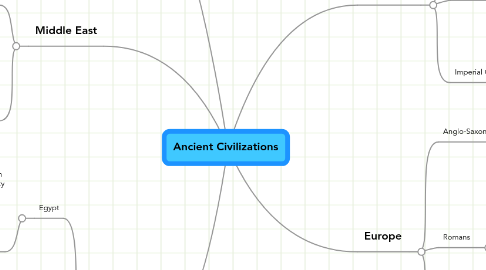
1. Americas
1.1. Incan Civilization
1.1.1. It was estimated there were over 10 million Incas living in the empire when Pizarro arrived. How could Pizarro, with a mere 200 soldiers, bring down the entire Incan empire?
1.2. Aztecs
1.2.1. The Aztecs were known to be a ferocious, voracious, and violent empire. Captured enemies in battle were often sacrificed to their gods as an offering. Cortes, greatly outnumbered, was able to ally himself with surrounding enemy tribes of the Aztecs, and was able to bring down the Aztec empire. It is true that many nations despise the United States. In your opinion, should the United States make an effort to make friends with other nations? Why does the United States have so many enemies? Who are friends of the United States? Why are these nations friends with the United States?
2. Africa
2.1. Egypt
2.1.1. In ancient Egypt, only a few people were allowed to train in order to become scribes. Is not having the opportunity to read or write a form of subjugation? What limited opportunities exist for those who are unable to read or write? Is there anyone at fault if someone is unable to read or write? Did society let them down? Is there personal responsibility if someone cannot read or write? If so, how does one learn to read or write?
2.2. Great Zimbabwe
2.2.1. Not much is known about the ancient civilization of Zimbabwe. It is believed the civilization collapsed between 1420 and 1450AD. What are some reasons why civilizations simply disappear? What factors are involved? Could the United States ever reach the same fate? Why?
2.3. Benin
2.3.1. Benin began trading with European civilizations beginning in the mid-fifteenth centuries. A trade dispute with Britain in the nineteenth century led to the colonization of Benin by Britain. In the 1990s, Iraq invaded Kuwait because of the rich amounts of oil Kuwait possessed. The United States came to Kuwait's aid in the war known as Desert Storm. Should other nations have come to Benin's aid in the nineteenth century? Why didn't this happen? Why do countries help some countries and not other countries? The commodity Britain was most interested from Benin was copper.
3. Middle East
3.1. Byzantium
3.1.1. In 532AD, Emperor Justinian built Hagia Sophia, which was the world's largest church for over 1000 years. Should there be a separation between Church and State? What are the pros and cons of combining church and state? Can you force someone to adhere to a certain religion? In the Middle East, there are many nations ruled by a theocracy. What are the dangers of this?
3.2. Mesopotamia
3.2.1. The code of Hammurabi is one of the earliest forms of written law in ancient history. What are the benefits of structure and living under the law? If America did not have laws, what would like look like?
4. East Asia
4.1. Feudal Japan
4.1.1. When a samurai passed, members of the lower classes were required to bow and show respect. If a farmer or artisan refused to bow, the samurai was legally entitled to chop off the recalcitrant person's head. If respect is demanded, then is it really respect? How would you define respect? Is showing a respect a good thing? Are there limitations to showing respect?
4.2. Ancient China
4.2.1. Defensive walls began to be built in Ancient China. Soon these walls would be linked together to form the Great Wall. Why do civilizations build walls? On the southern border of the United States is a wall. Do you see similarities between the Great Wall and the border wall at our southern border?
4.3. Imperial China
4.3.1. The Silk Road opened China to the rest of the world. Many ideas and resources were exchanged on the Silk Road. China was able to develop many new inventions during this time. Isaac Newton once said that we stand on the shoulders of giants. What does that mean? What is the importance of sharing ideas? The pro-democratic revolutions around the Middle East in the early part of 2011 relied on the sharing of ideas, especially on Facebook and Twitter. Would these domocratic movement occur if ideas were not shared?
5. Europe
5.1. Anglo-Saxon Britain
5.1.1. Many wealthy and famous people were buried with riches, including gold and silver. Do you see similarities with people who die in this country? Is this fair? Are some people more important than others?
5.2. Romans
5.2.1. The Romans enjoyed watching gladiatorial events in the Coliseum. Among those who would fight include condemned criminals. These criminals would almost always eventually be killed in these events. Competing in these gladiatorial events was essentially a death sentence for these criminals. The eight amendment protects its citizens from cruel and unusual punishment. Would the way in which the Romans treated their criminals be considered cruel and unusual? Is how the United States handles the death penalty cruel and unusual?
5.3. Ancient Greece
5.3.1. Not everyone in ancient Greece was eligible to ever become a citizen, yet ancient Greece is sometimes referred to as a democracy. Would ancient Greece still be considered a democracy today?
